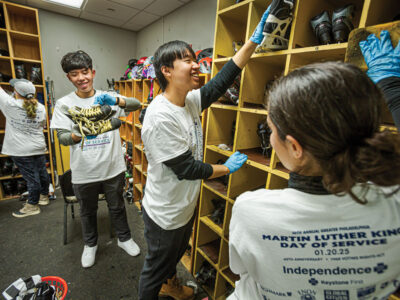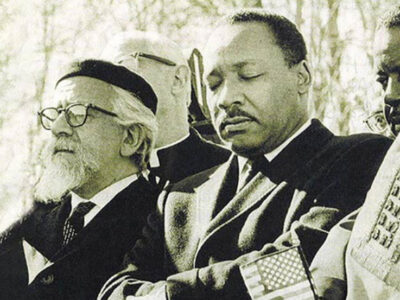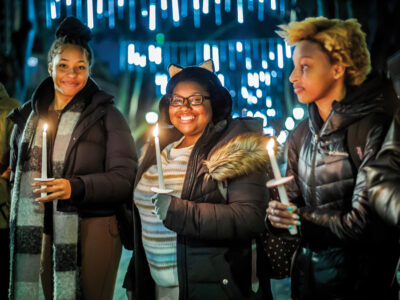In January, a month when Penn commemorates Martin Luther King Jr., the University hosted an evening with the Democratic political strategist Donna Brazile. While the event was billed as the annual Dr. Martin Luther King Jr. Lecture in Social Justice, President Amy Gutmann noted early on that it would be more conversation than oration.
“Fifty years ago,” Gutmann said, “Dr. King delivered a speech at Dartmouth College, and he said, ‘One of the great tragedies of life is that more often men live in monologue than in dialogue.’ Well, what you’re in for tonight is a true dialogue.”
Gutmann called Brazile “a woman who has made positive change the focus of her career,” outlining Brazile’s path from a childhood with dreams of political activism to becoming the Democratic National Committee’s vice chair of voter registration and participation.
Brazile acknowledged the role that King played in her lifelong political involvement. She recalled the night when, at eight years old, she learned he had been killed. Against her parents’ wishes, she snuck out to a nearby Baptist church, where the minister discussed King’s life and legacy, his commitment to peace and justice, and his dream of equality. He also announced plans to start a voter registration drive in Brazile’s part of New Orleans.
“I left that church inspired,” she told the audience gathered in The Zellerbach Theater. After returning home to find her mother “waiting on the back porch with a switch,” Brazile rallied her siblings and made an announcement: “I said, ‘Guess what? We’re going to conduct a registration drive.’ That began my movement, my own personal journey into American politics.”
Forty-four years later, Brazile called her story—she was the first African-American woman to manage a presidential campaign (for Al Gore’s 2000 run) and is also a professor and published author—“proof that Dr. King’s fight for civil rights was not only the right thing, but the just and moral thing.”
Sitting on stage beside Camille Zubrinsky Charles, the Edmund J. and Louise W. Kahn Term Professor in the Social Sciences at Penn, Brazile also discussed President Barack Obama’s critics, the stereotypes that still plague women today, and the implications of the Occupy Wall Street movement. Here is an abridged version of that conversation.
Camille Charles: What do you see as the state of class and the concept of class in the US right now, and how do you think class will play into the 2012 election?
Donna Brazile: It’s an issue that doesn’t really have a ready-made policy fix, because most Americans don’t see government playing a role in closing this so-called wealth gap. Remember, this is 30 years in the making. This didn’t just crop up overnight.
I keep telling the White House and President [that] this is going to be a fight. When we get through this fight, we might settle the question that we’ve been avoiding: What kind of country are we going to become in the 21st century? And ultimately, everyone in this room will have to take part in this conversation. Otherwise, the top one percent is going to answer every time we hold elections, and we know what their reply will be: “All about me.” Look, I’m sorry, it’s not about you, it’s about all of us. That’s why we call ourselves the United States of America. And that’s what we have to be.
CC: During the week of January 9, Tavis Smiley announced that he’d been replaced as an MLK Day speaker [at an event hosted by the Peoria Civic Center, in Illinois] by Michael Eric Dyson. He claims that his replacement was due to critical comments that he’s made publicly about Obama’s record on issues around poverty and in the African-American community more generally … Do you think that Tavis Smiley has a point on the need for presidential accountability dealing with issues around poverty, or should this responsibility rest with the broader society?
DB: I understand there’s some friction between those who believe that, with our first biracial president, all comments and criticisms should be held outside in the closet where no one can hear. I think that would be a huge mistake.
The bottom line is Tavis Smiley and Cornel West, in my judgment, have raised some important moral questions about the depth of poverty in this country … I don’t like to shut people down simply because they disagree with the president and criticize the president. The people who I have fault with are the people who just tell lies and then we’re out there every day trying to dispute a lie. Let me tell you, it’s difficult to dispute a lie, especially when people believe it.
need this conversation, and we should allow people to disagree with this president.
CC: I want to touch on the issue around Michelle Obama and Jodi Kantor’s portrayal of her as an angry black woman [in Kantor’s recent book The Obamas]. Why do race and gender-based stereotypes still exist today, and what does it say about the future of women, particularly women of color, in American politics?
DB: I bought Jodi’s book and I’m halfway through it. And I don’t get that. What I get from reading the book is that [Michelle Obama] is pretty much like every other first lady. She has put up her boundaries, her markers, and she has said, “This is what I will do, this is what my kids will do, this is how my family’s going to be run” … Michelle Obama is pretty much acting in accordance with how Hillary Clinton, Laura Bush, Nancy Reagan, and all the other first ladies before her acted.
When you don’t know people, when you have essentially restricted or reduced or marginalized people, then you make up these myths, these stereotypes, and then we have to spend centuries trying to get out of those generic boxes you put us in. I tell people, “That’s your little box—stay in there, go crawl in like a little rat or a roach. I’m not going to. I’m free.” This is what freedom feels like and this is what it looks like. You can give me directions, you cannot give me orders, and I have no anger. None whatsoever. And there’s no trace of anger in my voice or in my looks. If you think this is an angry woman just because I simply said, “No,” please.
There are too many women in this country who’ve been passed over simply because they’re female. There are too many people in this world who’ve been passed over simply because they’re female. We as women have to decide whether or not we want to take control of our own future and destiny. We have the power. We’re 54 percent of the voting-age population. We can determine every election if we want to. We can put women in the White House, we can put women in Congress, we can put women wherever we wish women to serve. It’s about us. It’s time that we start feeling a little bit different about ourselves.
CC: How do you see the Occupy movement in the United States in terms of the global consequences and implications? What does it say about how we’re moving as a global society?
DB: I wish it was more than an earthquake. I want it to be a full revolt. You cannot just occupy a park or a building or an institution for two, three weeks—or two, three months—and expect the world to change. That’s an earthquake. You’re just shaking things up. No, you need a revolt. You need to change the way you think. People have to understand that it is not just about occupying a space at times, it’s about changing people’s minds. Changing their lives.
We still have a long way to go and we are going to have to be at this struggle for more than just two, three, four, five months. This is not seasonal activity. This is a lifetime of struggle. And if we’re firmly committed to the principles and the values and the ideals that Dr. King lived, then we’re going to have to commit ourselves to doing his unfinished work. If we do that, we won’t have to occupy just Wall Street. Our whole lives will be transformed in the process. Our communities will be transformed, and of course our nation and the world.
—Molly Petrilla C’06




